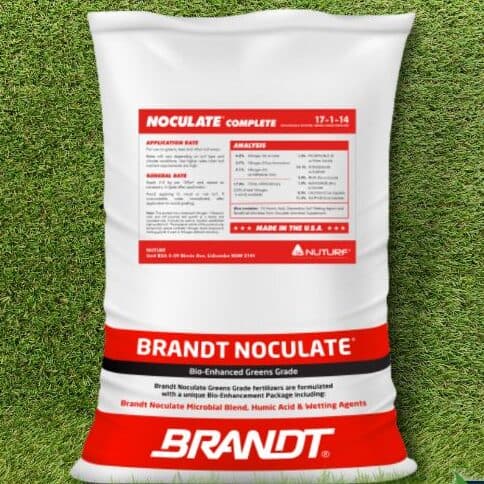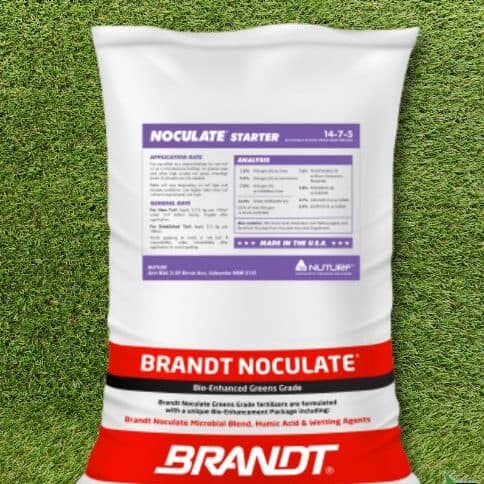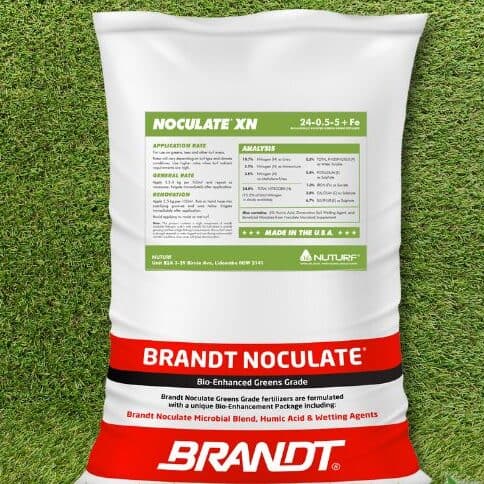Brandt Noculate
Each of the Noculate granular products contains high quality nutrition along with humic acid, kelp, soil wetting agent and
24 strains of beneficial microbes.
The Noculate Range of fertilisers are manufactured using a unique, technology driven production process. Each individual formulation benefits from the addition of a select group of highly beneficial soil microorganisms. These microscopic elements have the ability to fix atmospheric
nitrogen and solubilise minerals in the soil profile enhancing plant nutrition.
Soils contain many naturally occurring inorganic substrates such as calcium phosphate, which are not plant available.
Many of the microbial species in Noculate fertilisers have the capacity to produce organic acids which solubilise a portion
of the calcium phosphate. The end result is more calcium and phosphorus is made available to the plant essentially tapping
a nutrient reserve not available under normal circumstances. Noculate fertilisers also incorporate nitrogen-fixing bacteria
into their fertiliser blends, which serves to help satisfy the nitrogen requirements of plants. Free-living, nitrogen-fixing bacteria have the capacity to convert di-nitrogen (N2) from the atmosphere into a plant available form of nitrogen (NH3).
Roughly 2/3 of the global input of fixed nitrogen arises from biological processes.
Independent studies have shown that soils rich in nitrogen fixing bacteria can sequester upwards of 100 Kg of N per
hectare per year thus supporting the importance and benefit of incorporating nitrogen fixing bacteria into fertiliser blends. The addition of microorganisms also enhances a plants ability to absorb nutrients. A complex series of biochemical
reactions increases the permeability of the plants cellular membrane, which in turn facilitates nutrient uptake. Tissue analysis trials at Auburn University in USA have consistently shown that plants fed biologically enhanced fertilizers contain
more nitrogen, phosphorus and potassium than plants fed non-biologically enhanced fertilisers with the same N, P, K analysis.
The addition of microorganisms, also serves to prolong the fertilisers ability to stimulate growth by reducing the incidence of nutrient leaching. Soil bacteria incorporate free nitrogen into their metabolic functions. Much of this nitrogen would have been lost to the plant through the leaching process
had the bacteria not incorporated it into their cell mass and temporarily stored it. This storehouse of nitrogen is then
returned to the plant through a complex process known as nutrient mineralisation. In short, the addition of beneficial soil microorganisms to Noculate fertiliser blends serves to satisfy the short term and long term nutritional requirements
of the plant. These microorganisms have the capacity to expedite nutrient availability, facilitate nutrient absorption and to continue providing these nutrients fungi). Many soil bacteria have the capacity to produce a glue-like substance (polysaccharides), which serve to create micro-aggregates in the soil profile. These micro-aggregates are then bound together by fungal hyphae to create macroaggregates. This biologically induced process improves soil structure over time
enhancing percolation as well as the oxygen holding capacity of the soil matrix.
- Reseller Range
Noculate Complete 20kg

Noculate Complete greens-grade fertiliser is scientifically designed to address both biological and chemical needs of...
Analysis: 17-1-14 + 2%Fe 1%Mn 1% Humic, Wetters & Microbes (30%MU) SGN100Price$143.00 inc. GSTDetails - Brandt Noculate
Noculate Starter 20kg

Noculate Starter greens grade fertiliser is scientifically designed to address both biological and chemical needs...
Analysis: 14-7-5 + 3% Ca 8% Humic, Wetters & Microbes (50%MU) SGN100Price$143.00 inc. GSTDetails - Brandt Noculate
Noculate XN 20kg

Noculate fertiliser is scientifically designed to address both biological and chemical needs of soil nutrition....
Analysis: NPK 24:0.5:5 + 1% Fe SGN100Price$143.00 inc. GSTDetails
